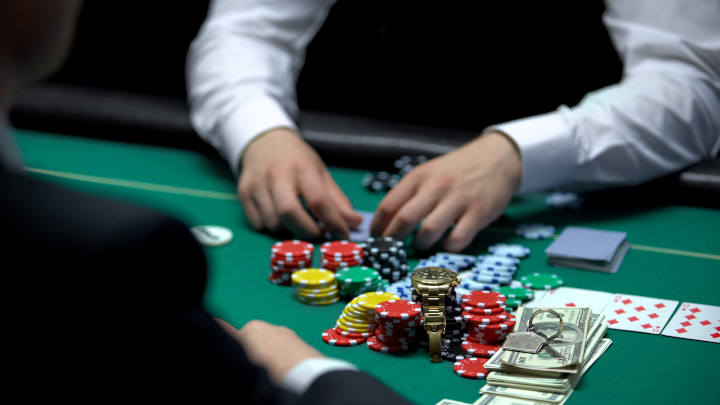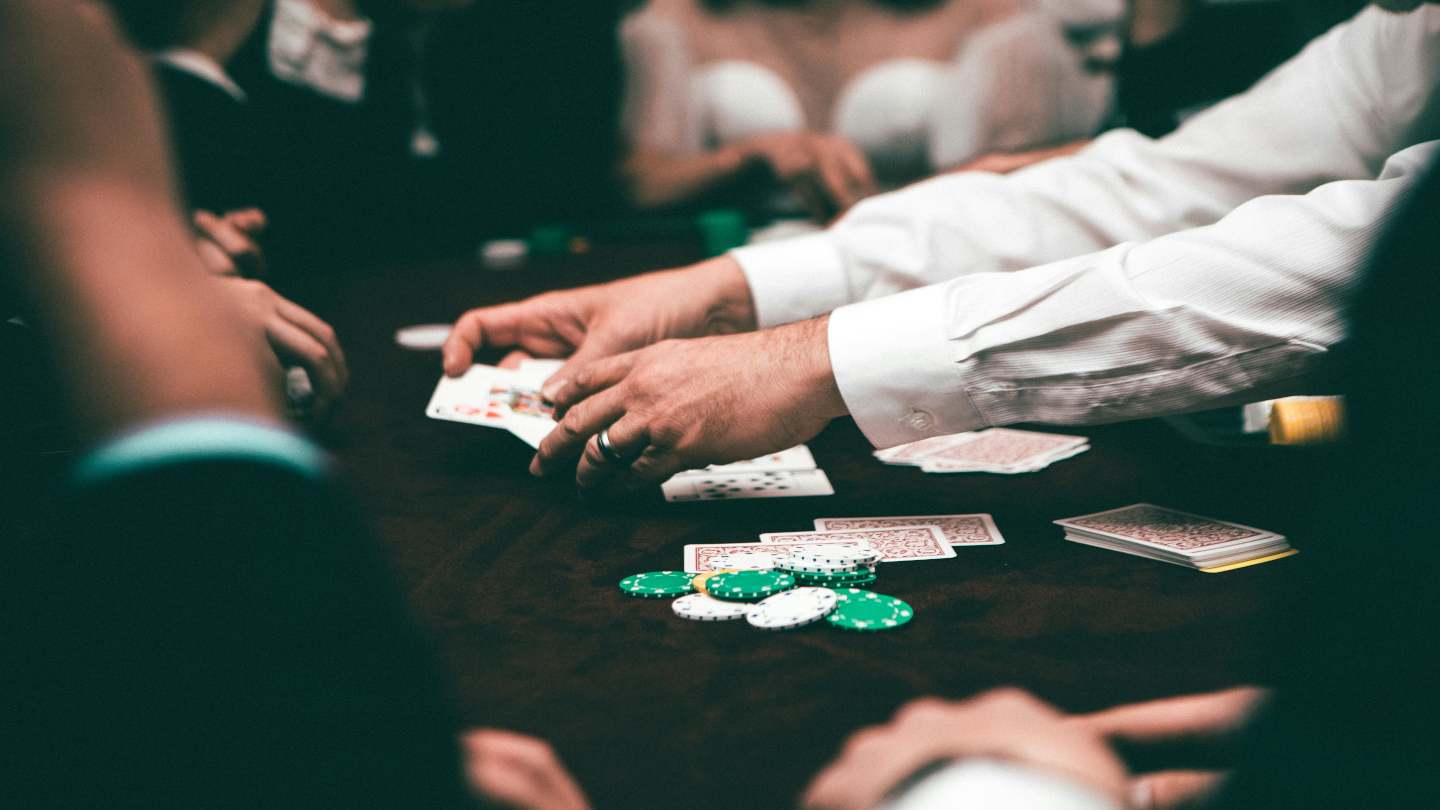Poker Downswing – How to Control Your Emotions and Make Better Decisions?

11 minutes
disheartening downswings no player wants to go through. But, the fact that you’ve opened up this page to learn more about how to deal with them is already a big step in the right direction.
Properly handling and controlling your downswings will be the difference-maker that will separate you from all other players that don’t know how to do so.
In this detailed poker downswing guide, we’ll share with you the best tips on how to handle a lousy downswing and address some of the most significant aspects that can lead to a bad run in Texas Hold’em and poker in general.
What is a Downswing in Poker
Simply put, a downswing is an extended period in which a player can’t manage to sustain any wins that would pick them up. Just like upswings and winning streaks, downswings are unfortunately an entirely natural occurrence in the game.
Poker downswings are bound to happen to every player from time to time.
Take into account that the downswings can differ depending on whether you’re playing online or in a live poker environment. While you are playing the same game and getting into the same situations, there are two main differences between online and live poker downswings.
The first, and more notable one, is that your win rate is higher in live poker, and your overall variance is significantly lower. But, this also comes with the opposite effect.

In the live environment, you can’t play nearly as big a volume of poker hands as in online poker during the same time span. This means that online poker allows you to get to the long run much quicker than live poker.
How Long Does an Average Poker Downswing Last?
There’s no going around this topic without addressing the most painful part – how long will your poker downswing last?
In truth, this varies from player to player. That said, the most important tool you can use to understand how long your downswing will last is your win rate.
Win rate is most commonly calculated in big blinds won per 100 hands and expressed in BB/100. The bigger the win rate, the less of an impact you’ll feel from poker variance.
Online players can calculate their win rate effortlessly by using tracking programs like Poker Tracker 4 that’ll provide them with accurate and helpful information.
If you’re a live poker player, calculating your win rate is a bit more challenging but not impossible. The key thing you should know is how many hands you’ve played and how many big blinds you’ve won during that time.
The approximate number of hands per hour in a live poker setting ranges between 25 and 30.
However, this information aside, we want to stress one thing for the sake of transparency. If you’re a losing poker player, downswings or not, you’ll always lose money in the long run. In this instance, this is the first thing you should pay attention to and work on.
Best Tips for Dealing with a Poker Downswing
Now that we know exactly what poker downswings are and how frustrating and demoralizing they can be, we need to address the best ways on how to act on them to minimize the damage they can cause.

And, while recalling all of these tips and tricks can be challenging if you find yourself amid a rough poker downswing, just remember that you can and will end it if you focus on doing so. To help you out, here are the four best tips on how to deal with a poker downswing:
1. Study and Understand Your Poker Game
Let’s get deep for a second. The famous philosopher and strategist Sun Tzu said: “If you know the enemy and know yourself, you need not fear the result of a hundred battles.”
Being a highly strategic game, poker requires you to know your opponent, but primarily, know yourself.
Studying is invaluable in poker. The more you study your game and learn how to apply different strategies, the more confidence and skill you will develop over time. In return, this will directly improve your mental game and contribute to less damaging and shorter downswings.
In other words, when you’re going through a downswing, your game starts to fall apart, and you must learn and adapt to overcome this problem.
The only way to do so is to focus directly on the problem and work on your skills from an objective standpoint. You may be surprised at how quickly you can get out of a downswing when you apply to studying your poker game and focus on better understanding fundamental poker odds and math.
2. Every Session is an Opportunity on Its Own
When you find yourself in a poker downswing, one dangerous thing that can get you in even more trouble is the dreadful “poor me” mindset.
You can quickly start feeling like it’s not meant to be, that you’ll always lose out in the end, or that you simply always get dealt the worst hand. Do not let yourself fall into this trap.
Always remember that every poker session is a clean slate, an opportunity to start fresh and write your own success. If you’ve applied the first tip and studied your game even during a rough downswing, you should approach every following session with more confidence in your skills and mental state.
3. Maintain a Clean Perspective
This may sound like something straight out of a self-help book, but it is helpful and will significantly impact your success in dealing with a poker downswing.
Never forget that you’re a winning poker player. You’ve won before, and the downswing you’re currently going through is something that happens to everyone. It will inevitably go away!
Keeping a clean perspective is crucial if you want to stay in the game for the long run. Because of this, and especially if you’ve been playing poker for a while, you should treat the downswing as a lack of short-term luck in a game that heavily favors long-term skill.
4. It’s Okay to Take Time Off
If you’re currently going through a terrible downswing and feel like you don’t have the energy to put in the effort and focus on the three tips we’ve talked about above, remember you always have the option to step away and take some time off.

Nobody’s forcing your hand, and you should only play poker as long as you enjoy it. You should never go through your sessions mechanically.
Taking a couple of days or weeks off can be very effective in getting back on your feet. You can leave the frustration and focus on regaining your confidence and mental strength by doing the things that make you happy. You’ll be amazed just how better you’ll play once you come back to the table fresh and with a clear mind.
Extra Tips – Dealing With Tournament Downswings
Before moving to the next crucial topic, we also want to put the spotlight on tournament downswings for a bit. Most of these tips apply to cash game players, but tournament players can also quickly get into poker downswings.
Moreover, tournament downswings can be even more dangerous. Even the best poker players can experience months without a solid tournament run. This can have a significant negative impact on your confidence and mental game.
When experiencing a lengthy tournament downswing, you can still apply strategies like studying more, working on your mental game, and avoiding tilt, just like you would in regular cash games.
Additionally, you can apply a couple of more things to mitigate the damage of tournament downswings. The most important thing to keep track of if you’re a tournament player going through a downswing is to have a healthy poker bankroll.
Move down stakes if necessary, but make sure you have at least 300 buy-ins for the stakes you’re playing.
What is a Tilt in Poker
Tilting is another crucial subject to highlight when talking about poker downswings and keeping tight control of your game. In simple words, tilting in poker is when you make poor strategic decisions because of mental or emotional frustration.
Poker tilt mostly manifests through overly aggressive betting, which usually ends up with very costly consequences.
When you lose and feel that you’re starting to tilt in cash games, you can simply get up and walk away from the table. But you can’t do this in tournament situations, so tilting can be more dangerous.
If your opponent deals you a bad beat in a tournament setting, or you get coolered, you have to pick yourself up right away and continue playing. This requires great mental strength, as you need to focus on the moment and put the bad beat behind you. Doing so can be challenging, but it’s not impossible if you put in the effort.
How To Not Get Tilted in Poker
Overcoming tilt is one of the key elements of the game every beginner needs to master if they want to progress and become better at poker.
Luckily, there are many facets you can work on to make sure you minimize the chances of getting tilted. Let’s take a closer look at the most effective ways to keep yourself from tilting at the poker table:
- Know What Triggers You – All players tilt, but not all players are triggered by the same things. Some players tilt the worst because of their own mistakes or their overall mood. Others can tilt because of a bad beat. Some poker players can even tilt just because of a slow-roll or table banter from opponents who manage to get under their skin.
- Go Easy on Yourself – Dwelling on your mistakes won’t get you anywhere in life, so why apply this mindset to poker? Everyone makes mistakes when playing poker. It’s how they act after that can make a significant difference. Getting stuck on one misstep won’t just cost you the amount you lost on that hand but affect your game in future pots as well.
- Winners Can Tilt Too – Most beginners get surprised by this fact, but the thing is that not all tilts stem from negative causes. Getting too comfortable at the table after a couple of big wins can lead to terrible tactical decisions sprouting from over-confidence. So, no matter how well you’re playing, don’t move away from your usual game-plan. Just like with bad hands, good hands in the past don’t indicate your future success.
- Know When to Walk Away – As we mentioned above, in some settings, like tournaments, you won’t have the option of walking away. But, if you do have such an opportunity when playing, you should know when to do so. Whether you’re playing in a casino or online, the moment you feel you might be tilting, walk away and take time to regain your composure. You can come back to the game at any time, just make sure you’re thinking with your head and not your heart when you do so.
With all of this said, we want to note one crucial thing. When it comes to tilt control in poker, you have to bear in mind that there’s no secret trick on how to stop tilting entirely. Everybody can tilt. It happens even to the pros.
Just like good bluffs, bad hands, and everything in between, tilt is something that’s simply a part of the game. If you want to be successful, the key isn’t to eliminate tilting entirely, as you can’t do this. The key is to be aware of it and learn how to control it.

Even the best to play the game aren’t tilt-free robots, so you shouldn’t beat yourself up if you happen to tilt from time to time. Just try to learn and understand why you tilted and make an effort to improve on it.
That way, you’ll minimize the negative impact of tilt in poker and even improve on some aspects of your mental game.
Poker Downswing, Tilt, and Poor Decisions – The Bottom Line
Poker is a game that takes a lifetime to master. No matter how long you’ve been playing or how much you know, you can always learn new things and improve your game.
With that in mind, downswings are just a part of the giant puzzle. They will happen every so often, and there’s nothing you can do to prevent them.
However, with the information and tips we’ve shared with you on this detailed page, you now know the most critical steps to take to shorten a poker downswing and minimize the financial damage it can cause you.
To leave you off, we want to mention that poker can be profitable for anyone. There are no players destined to be winners or losers. There’s only poker variance. So, while downswings can be a pain, just remember that with effort, responsible play, and dedication, you will turn it around and end up with solid poker income!
- Poker Squeeze Play – Which Hands Make the Most Sense for Squeezing? - August 10, 2023
- How to Play Low Pocket Pairs in Texas Hold’em - July 29, 2023
- How to Make Deep Runs in MTTs More Often - July 22, 2023














